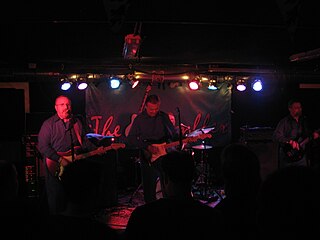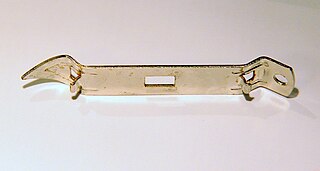History
In 1960, three young friends, Al Valdez at the piano, Mike Biondo on drums, and Richard Lippy played at the 8th grade graduation dance of St. Mary's Elementary School in Fullerton, California. [1]
In the summer of the same year, Valdez, Biondo, guitarist Bobby Esco, and sax player Bob Bernard formed The Vogues and started playing at school assemblies. [1]
Guitarist Larry Weed, with a country and western musical background, replaced Esco soon after. Weed, notably, used to wear his belt buckle on the side when onstage, "so he would not scratch the back of his Fender guitar". [2]
In late 1961, a Sunday morning all-Mexican television show on KCHOP channel 13 announced that they were looking for musical groups to play on the show, and Valdez's mother phoned the show to submit the candidacy of the band her son was playing in. The Vogues, with Doug Wiseman having replaced Bob Bernard on sax, were contacted by Victor Regina, owner of a pizza stand on Western Avenue, also doubling as a music agent, who helped them, under the new name he gave them, The Customs, record their first single, "Steppin' Out" and "Hi Hat", both written by former member Bobby Esco. [1] Because Regina had put up all the money for the recording session, he took sole credit as the composer of the two songs. [3]
Bassist Jim Tran, who was playing in a Yorba Linda musical trio at the time, was added to the band, soon after the session. Around the early summer of 1962, they started appearing regularly at a bar near Big Bear, with Wiseman's and Biondo's fathers driving them there. Soon after, with Chuck Vehle also on guitar, they changed their name to The Surfaris, which was a word play between "surf" and "The Safaris", a music group well known at the time [4] for their hit "Image of a Girl". [3]
The Danville Battle of the Bands gave the group a lot of exposure and more jobs. They started playing in the Ventura/Oxnard area. While performing there, they backed Bobby Vinton and others. [5]
Between October 1962 and through January 1963, they recorded in the studio of producer Tony Hilder a number of songs written by Larry Weed, such as "Moment of Truth" and "Delano Soul Beat", also recording covers of "Ghost Riders in the Sky" and "Pipeline". The tracks "Moment of Truth" and "Delano Soul Beat" were released on Hilder's own Impact label, as part of a surf music compilation album titled Shake, Shout and Soul. [5] These tracks subsequently appeared on various compilation albums, such as Wheels (Diplomat Records LP 2309); The World of Surfin' (Almor LP 108); Surf's Up at Banzai Pipeline (Northridge Records LP 101); and others. [5]
After some months, the band again went into the studio with Hilder producing and recorded a number of tracks intended to be released on the Impact label, as their first full-length LP. Two of the tracks, "Bombora" [6] and "Surfari" were leased to Del-Fi Records, which sent them out as a single. But the record, even though it started selling well in the state [5] had to be pulled from the stores because of a lawsuit.
It was in early 1963 that, while the band was on the road, the surf instrumental "Wipe Out" came out and broke big nationwide. [4] It was written and performed by a Glendora, California band who also called themselves The Surfaris. The Glendora group's management sued for the exclusive use of the name and, in the trial that followed, the judge awarded them sole use of "The Surfaris". However, the judge also allowed the Fullerton band to carry on under the name The Original Surfaris, although they continued to be billed in the various venues they played as "The Surfaris".
After recording hot rod tracks, such as "Gum-Dipped Slicks", The Original Surfaris started changing their musical style, and Jim Tran along with Al Valdez left the group. The Original Surfaris started doing more vocals, in the soul and blues vein, [1] until eventually breaking up in May 1965.
Legacy
The Original Surfaris, in their various incarnations, were "one of the most highly regarded" and "creative" surf groups of the 1960s, but also remained at the time "one of the most obscure" ones. [1] Critics described their music as featuring "reverb galore, swaggering sax and a tough surf sound", [7] while their best tracks were praised for their "spooky reverb guitar lines and Latin-influenced minor melodies that were hallmarks of much of the best instrumental surf music. [8]
They rose and peaked at a very young age: One night in 1962, the band was playing in a hotel bar and they got arrested by the police because they were all under 18 years old. [1] Another surf music group from Los Angeles named themselves The Bomboras inspired by the instrumental track.
The Original Surfaris allegedly never received any money for the tracks they recorded with Tony Hilder, since they had signed all their publishing rights away for one dollar per song. [1]
In 1995, the album Bombora after being shelved for over thirty years, was finally released on the Sundazed label. [9]

The Surfaris are an American surf music band formed in Glendora, California, in 1962. They are best known for two songs that hit the charts in the Los Angeles area, and nationally by May 1963: "Surfer Joe" and "Wipe Out", which were the A-side and B-side of the same 45 rpm single.
Surf music is a genre of rock music associated with surf culture, particularly as found in Southern California. It was especially popular from 1958 to 1964 in two major forms. The first is instrumental surf, distinguished by reverb-heavy electric guitars played to evoke the sound of crashing waves, largely pioneered by Dick Dale and the Del-Tones. The second is vocal surf, which took elements of the original surf sound and added vocal harmonies, a movement led by the Beach Boys.

The Trashmen were an American rock band formed in Minneapolis in 1962 and are best known for their biggest hit, 1963's "Surfin' Bird", which reached No. 4 on the Billboard Hot 100. The original line-up of the group featured guitarists Tony Andreason and Dal Winslow, bassist Bob Reed, and drummer Steve Wahrer.
The Sentinals were a surf rock band from San Luis Obispo, California (1961–1965). The band is notable for a Latino influence in some works, such as "Latin'ia" (1962). Notable band members included Tommy Nuñes, drummer John Barbata and Lee Michaels on keyboards.

Sundazed Music is an American independent record label founded and based in Coxsackie, New York. It was initially known as a '60s-centric surf, garage, and psych label. Over time with the additions of imprints such as Modern Harmonic, Americana Anthropology, Beat Rocket, Dot Matrix Recordings, and Liberty Spike Recordings, their reach spans most genres and many decades while still firmly rooted as an archival label.
The Centurians were an instrumental surf rock band started by Dennis Rose from Newport Beach, California. They were active in the late 1950s and early 1960s. Their music has been used in at least two films. They reformed as The Centurions in 1995 and released new material.
The Bomboras are an American all-instrumental surf band from Los Angeles, California, United States. The band was formed in the summer of 1994, sharing a love of 1960s surf and garage music such as The Ventures, Booker T, and The Sonics.

Surfbeat was the first album recorded by the Los Angeles-based surf rock group The Challengers. They recorded the album in a 3½ hour session at the end of 1962. The album was released in early 1963 and became a huge hit, helping to propel the surf genre. It was sought by collectors for many years and gained great notoriety in the obscure surf market. In 1994, Sundazed records, a company with a lot of vintage surf at its disposal, released the album on CD with two bonus tracks.

Lloyd Thaxton Goes Surfing with The Challengers is the second album by the surf rock band The Challengers. This album was issued in 1963, at the peak of the "surf wave", in South California. This record was a "hard to find" LP, until the Sundazed Music cie released it back, in 1994, with 2 previously unissued bonus tracks.
The Revels were an American rock band from California, associated with the 1960s surf music craze. They had hits with "Six Pak", and "Church Key" which was their most famous single.
Anthony J. Hilder was an American author, film maker, talk show host, broadcaster, news correspondent and former actor. In the late 1950s to the mid-1960s he was also a record producer, producing music mainly in the surf genre. He headed a couple of record labels as well as working for various others. He was also a publisher.
Impact Records was a California based record label run by CT Records creator, Tony Hilder in the 1960s. This label released some surf records by The Crestwoods, Dave Myers and The Surftones, The Ramblers and The New Breed and The Revels. The Revels were known for the hits "Comanche" and "Intoxica".

"Church Key" is an instrumental single that was released by California surf group The Revels on Tony Hilder's Impact Records label in 1960. It was a hit for the group and later a hit for Dave Myers and his Surf-Tones.
The Charades is a doo-wop, r&b group which was mostly active in California in the early to mid-1960s and has released a number of singles on various labels. One of the songs it recorded, which was associated with the surf genre, was "Surf 'n Stomp" on the Northridge label. The band also recorded for Tony Hilder's Impact label, and even had a release on a label owned by Fred Astaire. They had a minor hit with "Please Be My Love Tonight". The group, though it has been through some changes, still continues today, and has a history that spans six decades.
Dave Myers and The Surftones were a Southern California surf group who are most likely remembered for the few singles they recorded in the 1960s which include their cover of The Revels hit "Church Key" and their time at the Rendezvous Ballroom in Balboa, California.
Surfin' Guitars: Instrumental Surf Bands of the Sixties is a book by Robert J. Dalley which covers the instrumental side of the surf genre in the 1960s and looks at groups and artists from that era. It has been published three times with the first version published in 1988 and the third in 2015. It has been quoted and referred to multiple times in books relating to surf music.

Surf's Up! At Banzai Pipeline was a 1963 various artist record album compilation that featured recordings by The Surfaris, Dave Myers and The Surftones, The Soul Kings, Coast Continentals and Jim Waller & The Deltas. It has been re-released a couple of times since.
Norman Knowles is a surf musician, band leader, and record producer from California. He is the composer of several classic surf songs, including as co-writer of the surf classic "Church Key", which was a hit for The Revels. He also has been involved in band management, managing another surf band, The Sentinals. Knowles has made a significant contribution to the surf genre.

Charles Williams Wright is an American singer, instrumentalist and songwriter. He has been a member of various doo wop groups in the late 1950s and early 1960s as well as a solo artist in his own right. He is also the former leader and writer of hits for the group, Watts 103rd Street Rhythm Band.

"Exotic" is a song composed by Bruce Morgan and recorded by various bands back in 1963 when it was first released.









